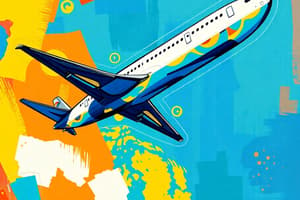Podcast
Questions and Answers
What is typically the lowest fare option when purchasing an airline ticket?
What is typically the lowest fare option when purchasing an airline ticket?
- Economy Class (correct)
- First Class
- Business Class
- Premium Economy
Which factor is generally NOT a direct influence on air fare prices?
Which factor is generally NOT a direct influence on air fare prices?
- Airline Ownership (correct)
- Supply and Demand
- Booking Time
- Route Distance
What is a characteristic of refundable tickets?
What is a characteristic of refundable tickets?
- They are the same price as non-refundable tickets.
- They cannot be canceled.
- They are usually non-transferable.
- They are usually more expensive. (correct)
During which situation would air fares typically be higher?
During which situation would air fares typically be higher?
Which fare class offers luxurious seating and top-tier services?
Which fare class offers luxurious seating and top-tier services?
Which of the following is NOT a method to find better air fares?
Which of the following is NOT a method to find better air fares?
What are advance purchase discounts designed for?
What are advance purchase discounts designed for?
Which type of ticket typically cannot be returned for a refund?
Which type of ticket typically cannot be returned for a refund?
Flashcards are hidden until you start studying
Study Notes
Air Fare/Ticket
Definition
- Air fare refers to the price paid for a seat on an airplane.
- It can vary based on several factors such as route, class of service, and demand.
Types of Air Fares
-
Economy Class
- Basic seating and services.
- Lowest fare option.
-
Premium Economy
- Enhanced services and comfort.
- Higher price than Economy but lower than Business.
-
Business Class
- Superior comfort and amenities.
- Higher fare, targeting business travelers.
-
First Class
- Luxurious seating and top-tier services.
- Highest fare option.
Fare Components
-
Base Fare
- The initial price of the ticket excluding taxes and fees.
-
Taxes and Fees
- Government-imposed taxes and additional fees from the airline.
-
Fuel Surcharges
- Extra costs that fluctuate based on fuel prices.
Factors Influencing Air Fare
-
Supply and Demand
- Higher demand leads to increased fares.
-
Booking Time
- Early bookings often result in lower fares.
- Last-minute bookings may be more expensive.
-
Seasonality
- Peak travel seasons (holidays, summer) generally have higher fares.
-
Competition
- More airlines on a route can lower fares.
-
Route Distance
- Longer distances typically incur higher fares.
Ticketing Rules
-
Non-Refundable vs. Refundable
- Non-refundable tickets are cheaper but cannot be returned for a refund.
- Refundable tickets offer flexibility but at a higher price.
-
Change Fees
- Charges applied for altering flight details on certain fare types.
Discounts and Promotions
-
Advance Purchase Discounts
- Lower fares for tickets bought well in advance.
-
Group Discounts
- Reduced fares for large groups traveling together.
-
Frequent Flyer Programs
- Loyalty programs offering discounted fares or upgrades.
Booking Options
-
Directly through Airlines
- Often provides the best customer service and options.
-
Travel Agencies
- Can offer package deals, including accommodation and other services.
-
Online Travel Sites
- Easy comparison of fares from multiple airlines.
Tips for Finding the Best Air Fare
- Use fare comparison websites.
- Set fare alerts for desired routes.
- Be flexible with travel dates.
- Consider alternate airports for potentially lower fares.
Air Fare/Ticket
- Air fare is the cost for a seat on an airplane, influenced by route, class, and demand.
Types of Air Fares
- Economy Class: Basic seating and services, offering the lowest fare option.
- Premium Economy: Provides enhanced services and comfort at a higher price than Economy but lower than Business.
- Business Class: Designed for business travelers, featuring superior comfort and amenities at a higher fare.
- First Class: The most luxurious seating and top-tier services, commanding the highest fare.
Fare Components
- Base Fare: Initial ticket price excluding taxes and fees.
- Taxes and Fees: Additional charges imposed by governments and airlines.
- Fuel Surcharges: Fluctuating extra costs based on current fuel prices.
Factors Influencing Air Fare
- Supply and Demand: Increased demand results in higher fares.
- Booking Time: Early bookings generally yield lower fares, while last-minute purchases are often pricier.
- Seasonality: Fares are typically higher during peak travel seasons like holidays and summer.
- Competition: More airlines operating on a route can lead to decreased fares.
- Route Distance: Longer flights usually entail higher ticket prices.
Ticketing Rules
- Non-Refundable vs. Refundable: Non-refundable tickets are cheaper but do not allow refunds; refundable tickets offer flexibility at a higher cost.
- Change Fees: Charges for altering flight details may apply depending on fare types.
Discounts and Promotions
- Advance Purchase Discounts: Lower fares for tickets bought well in advance of travel dates.
- Group Discounts: Reduced fares available for large groups traveling together.
- Frequent Flyer Programs: Loyalty incentives offering discounts or upgrades for regular travelers.
Booking Options
- Directly through Airlines: Often provides better customer service and options.
- Travel Agencies: Can offer combined package deals, including accommodation.
- Online Travel Sites: Allow easy comparison of fares across multiple airlines.
Tips for Finding the Best Air Fare
- Utilize fare comparison websites to find competitive prices.
- Set fare alerts for preferred routes to track price changes.
- Maintain flexibility with travel dates to secure better fares.
- Consider alternate airports, which may offer lower fares.
Studying That Suits You
Use AI to generate personalized quizzes and flashcards to suit your learning preferences.




